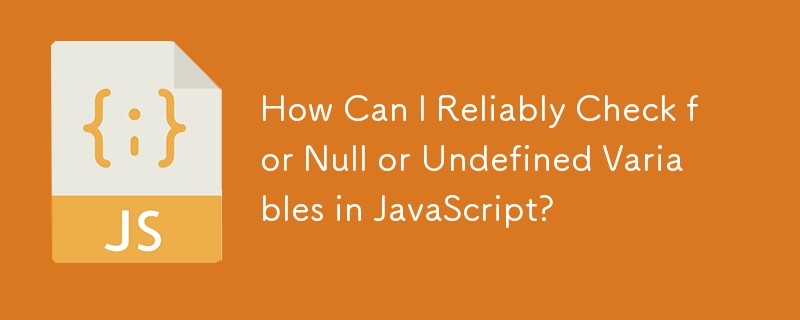

Exploring Reliable Null and Undefined Variable Detection in JavaScript
In JavaScript, ascertaining whether a variable is defined or has a value can be a recurring task. Many developers resort to the following pattern:
<code class="javascript">if (typeof(some_variable) != 'undefined' && some_variable != null) {
// Do something with some_variable
}</code>While this method is reliable, it can be verbose. Some sources suggest that simply checking if the variable exists has the same effect:
<code class="javascript">if (some_variable) {
// Do something with some_variable
}</code>However, certain development environments, such as Firebug, report an error when some_variable is undefined with the second approach.
A more efficient way to check for null or undefined variables is to utilize the following syntax:
<code class="javascript">if (some_variable == null) {
// some_variable is either null or undefined
}</code>This alternative is equivalent to the verbose version and is also supported by development tools like Firebug.
Notes:
<code class="javascript">if (!some_variable) {
// some_variable is either null, undefined, 0, NaN, false, or an empty string
}</code>Update 2021-03:
Modern browsers support the Nullish coalescing operator (??) and Logical nullish assignment (??=), providing a concise way to assign default values if variables are null or undefined:
<code class="javascript">if (a.speed == null) {
// Set default if null or undefined
a.speed = 42;
}</code>This can be rewritten using the Nullish coalescing operator:
<code class="javascript">a.speed ??= 42;</code>
The above is the detailed content of How Can I Reliably Check for Null or Undefined Variables in JavaScript?. For more information, please follow other related articles on the PHP Chinese website!
 The relationship between bandwidth and network speed
The relationship between bandwidth and network speed
 What types of files can be identified based on
What types of files can be identified based on
 What does legacy startup mean?
What does legacy startup mean?
 How to buy and sell Bitcoin? Bitcoin Trading Tutorial
How to buy and sell Bitcoin? Bitcoin Trading Tutorial
 Detailed explanation of nohup command
Detailed explanation of nohup command
 What does MLM coin mean? How long does it usually take to crash?
What does MLM coin mean? How long does it usually take to crash?
 How to buy Dogecoin
How to buy Dogecoin
 What is agp interface
What is agp interface




